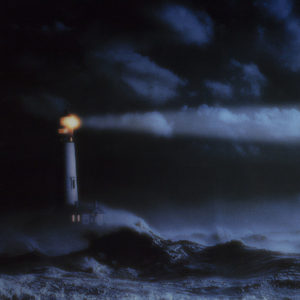Stereogum is a daily Internet publication that focuses on music news, reviews, interviews, and commentary. The site was created in January 2002 by Scott Lapatine.

John Maus is an American musician, composer, singer, and songwriter known for his baritone singing style and his use of vintage synthesizer sounds and Medieval church modes, a combination that often draws comparisons to 1980s goth-pop. His early lo-fi recordings anticipated and inspired the late 2000s hypnagogic pop movement. On stage, he is characterized for his intense displays of emotion while performing. He is also a former teacher of philosophy at the University of Hawaii, where he later earned his PhD in political science.

Rostam Batmanglij, known mononymously as Rostam, is an American record producer, musician, singer, songwriter, and composer. He was a founding member of the band Vampire Weekend, whose first three albums he produced. He has been described by Stereogum as one of the greatest pop and indie-rock producers of his generation. Rostam also works as a solo artist and is a member of electro-soul group Discovery. He produced his first number-one album, Vampire Weekend's Contra, when he was 27 years old.
"Running to the Edge of the World" is a song by American rock band Marilyn Manson. The track is from their seventh studio album The High End of Low (2009). The song is a soft rock power ballad with elements of blues, electronic music and 1980s heavy metal music that was written and produced by the band's eponymous frontman, Twiggy Ramirez and Chris Vrenna and co-produced by Sean Beavan. The track is about sex, death and destruction and features guitar and strings in its instrumentation and falsetto vocals from Manson. Music critics deemed the song a musical departure from the band's previous work and compared it to the music of other rock acts, particularly David Bowie.

Yoann Lemoine, known professionally as Woodkid, is a French music video director, graphic designer and singer-songwriter. His most notable works include his music video direction for Katy Perry's "Teenage Dream", Taylor Swift's "Back to December", Lana Del Rey's "Born to Die" and Harry Styles's "Sign of the Times".

"Kim & Jessie" is a song by French electronic band M83. Written by Anthony and Yann Gonzalez with Morgan Kibby, it was released in July 2008 as the third single from M83's fifth studio album, Saturdays = Youth.

Cloud Nothings is an American indie rock band from Cleveland, Ohio, United States, founded by singer-songwriter Dylan Baldi. It currently consists of lead singer and guitarist Dylan Baldi, drummer Jayson Gerycz, and bassist Chris Brown.

Charlotte Emma Aitchison, known professionally as Charli XCX, is an English singer and songwriter. Born in Cambridge and raised in Start Hill, Essex, Charli XCX began posting songs on Myspace in 2008 before entering the London rave scene. She signed a recording contract with Asylum Records in 2010, releasing a series of singles and mixtapes throughout 2011 and 2012. She later featured on "I Love It" with Swedish duo Icona Pop, with the song becoming her first number-one in the UK and receiving global success. Her debut studio album, True Romance (2013), was released to positive reviews but failed to meet commercial expectations.

We Must Become the Pitiless Censors of Ourselves is the third album by American musician John Maus, released on June 27, 2011. Its title is derived from French philosopher Alain Badiou's "Fifteen Theses on Contemporary Art". Maus said that he wrote the album in a "search for the perfect pop song". Upon release, the album was met with generally favorable reviews, a contrast from the reception of Maus' earlier work. Three singles were issued from the album: "Quantum Leap", "Believer" and "Hey Moon".

Spencer Proffer is an American media and record producer. He is the CEO of Meteor 17, a convergence media production company based in Los Angeles, California, United States. Proffer produced the first heavy metal record, Quiet Riot's Metal Health, to reach the top of the pop charts, selling six million albums. His Children of the Sun collaboration with Billy Thorpe spawned an animated laser choreography of an album in planetariums across North America. Proffer has produced and arranged over 200 albums, many of which have achieved gold and platinum-selling status, produced or executive-produced 17 films as well as supervised and produced music for 135 films and television.

Alexander Giannascoli, better known by his stage names Alex G or, formerly, (Sandy) Alex G, is an American musician, producer, and singer-songwriter. He started his career playing in multiple local bands such as the Skin Cells before he decided to pursue his own music career as a soloist. At 17, he began to record his own music and released his first album under the name Sandy in 2010. DIY self-releases on Bandcamp and began building up an audience with his label debut, DSU (2014), released on Orchid Tapes to critical acclaim from various publications. He later signed with Lucky Number, who reissued his earlier releases, Rules and Trick (2012).

Phantogram is an American music duo from Greenwich, New York, formed in 2007 and consisting of multi-instrumentalists and vocalists Sarah Barthel and Josh Carter.
Hypnagogic pop is pop or psychedelic music that evokes cultural memory and nostalgia for the popular entertainment of the past. It emerged in the mid to late 2000s as American lo-fi and noise musicians began adopting retro aesthetics remembered from their childhood, such as radio rock, new wave pop, synth-pop, video game music, light rock, and R&B. Recordings circulated on cassette or Internet blogs and were typically marked by the use of outmoded analog equipment and DIY experimentation.

Jacob Collier is an English singer, songwriter, multi-instrumentalist, producer and educator. His music incorporates a combination of jazz and elements from other musical genres, and often features extensive use of reharmonisations and close harmony. He is known for his energetic live performances, in which he often conducts the audience to sing harmony or play percussion parts. Collier demonstrates his harmonic expertise in lectures and master classes, particularly with his detailed analyses of songs like Stevie Wonder's "Sir Duke" and his own music.

Dedicated to Bobby Jameson is the eleventh studio album by American recording artist Ariel Pink, released on September 15, 2017, through Mexican Summer. It is the follow-up to 2014's pom pom and features a narrative Pink described in a press release as "a battery of tests and milestones, the first of which sees him [the protagonist] reborn into life out of death." It peaked at number 193 on the Billboard 200 and received generally positive reviews from music critics.

Colors is the thirteenth studio album by American musician Beck, released on October 13, 2017, by Fonograf Records & Capitol Records. The album was recorded between 2013 and 2017, with Beck producing alongside Greg Kurstin. The album's earliest single, "Dreams", was released in June 2015, while three more singles were released between June 2016 and September 2017. The title track was also released as a single in April 2018. The album won the Best Alternative Music Album and Best Engineered Album, Non-Classical at the 61st Annual Grammy Awards.

Addendum is the fifth studio album by American musician John Maus, released on April 20, 2018. It is a twelve-track collection that serves as an "addendum" to his previous album Screen Memories (2017). As Maus explained, "It was really more that I made an album, but then I realized I had two albums worth of stuff." Accordingly, the songs on Addendum were made in a more "carefree" manner than Screen Memories and are most resemblant of his usual style.

Rocket is the seventh studio album by American musician Alex G, released on May 19, 2017, through Domino Recording Company.

Eric Whitney, known professionally as Ghostemane or Eric Ghoste, is an American rapper and record producer. He has released eight solo albums and three collaborative albums under his Ghostemane moniker, primarily merging elements of heavy metal, hip hop and industrial music. Whitney has also released music with a number of additional solo projects, pursuing styles including black metal as Baader-Meinhof, noise music as GASM, and electronic music as Swearr. He began his career in local hardcore punk and doom metal bands around Florida. In 2015, he moved to Los Angeles, California, starting a career as a rapper, under the moniker Ill Bizz. Around this same time, he was a member of the hip hop collective Schemaposse.

Nation of Language is an American indie pop band that formed in Brooklyn, New York, in 2016. The group consists of Ian Richard Devaney, Aidan Noell, and Alex MacKay. Michael Sue-Poi was the bassist prior to the band's 2022 tour.



















